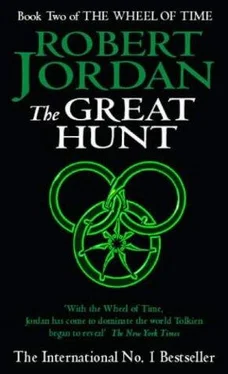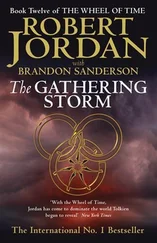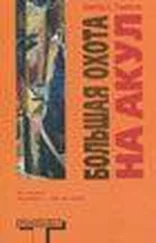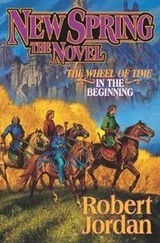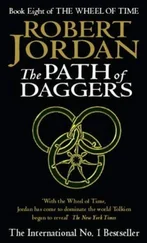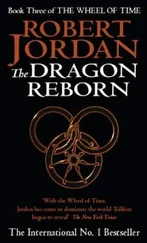Robert Jordan - The Great Hunt
Здесь есть возможность читать онлайн «Robert Jordan - The Great Hunt» весь текст электронной книги совершенно бесплатно (целиком полную версию без сокращений). В некоторых случаях можно слушать аудио, скачать через торрент в формате fb2 и присутствует краткое содержание. Год выпуска: 1990, Жанр: Фэнтези, на английском языке. Описание произведения, (предисловие) а так же отзывы посетителей доступны на портале библиотеки ЛибКат.
- Название:The Great Hunt
- Автор:
- Жанр:
- Год:1990
- ISBN:нет данных
- Рейтинг книги:4 / 5. Голосов: 1
-
Избранное:Добавить в избранное
- Отзывы:
-
Ваша оценка:
- 80
- 1
- 2
- 3
- 4
- 5
The Great Hunt: краткое содержание, описание и аннотация
Предлагаем к чтению аннотацию, описание, краткое содержание или предисловие (зависит от того, что написал сам автор книги «The Great Hunt»). Если вы не нашли необходимую информацию о книге — напишите в комментариях, мы постараемся отыскать её.
The Great Hunt — читать онлайн бесплатно полную книгу (весь текст) целиком
Ниже представлен текст книги, разбитый по страницам. Система сохранения места последней прочитанной страницы, позволяет с удобством читать онлайн бесплатно книгу «The Great Hunt», без необходимости каждый раз заново искать на чём Вы остановились. Поставьте закладку, и сможете в любой момент перейти на страницу, на которой закончили чтение.
Интервал:
Закладка:
Some places in the keep were empty of people, the folk who normally worked there released for the sudden holiday. The armorer’s forge, with all the fires banked, the anvils silent. Silent. Cold. Lifeless. Yet somehow not empty. His skin prickled, and he spun on his heel. No one there. Just the big square tool chests and the quenching barrels full of oil. The hair on the back of his neck stirred, and he whipped round again. The hammers and tongs hung in their places on the wall. Angrily he stared around the big room. There’s nobody there. It’s just my imagination. That wind, and the Amyrlin; that’s enough to make me imagine things.
Outside in the armorer’s yard, the wind swirled up around him momentarily. Despite himself he jumped, thinking it meant to catch him. For a moment he smelled the faint odor of decay again, and heard someone behind him laughing slyly. Just for a moment. Frightened, he edged in a circle, peering warily. The yard, paved with rough stone, was empty except for him. Just your bloody imagination! He ran anyway, and behind him he thought he heard the laughter again, this time without the wind.
In the woodyard, the presence returned, the sense of someone there. The feel of eyes peering at him around tall piles of split firewood under the long sheds, darting glances over the stacks of seasoned planks and timbers waiting on the other side of the yard for the carpenter’s shop, now closed up tight. He refused to look around, refused to think of how one set of eyes could move from place to place so fast, could cross the open yard from the firewood shed to the lumbershed without even a flicker of movement that he could see. He was sure it was one set of eyes. Imagination. Or maybe I’m going crazy already. He shivered. Not yet. Light, please not yet. Stiff-backed, he stalked across the woodyard, and the unseen watcher followed.
Down deep corridors lit only by a few rush torches, in storerooms filled with sacks of dried peas or beans, crowded with slatted racks heaped with wrinkled turnips and beets, or stacked with barrels of wine and casks of salted beef and kegs of ale, the eyes were always there, sometimes following him, sometimes waiting when he entered. He never heard a footstep but his own, never heard a door creak except when he opened and closed it, but the eyes were there. Light, I am going crazy.
Then he opened another storeroom door, and human voices, human laughter, drifted out to fill him with relief. There would be no unseen eye here. He went in.
Half the room was stacked to the ceiling with sacks of grain. In the other half a thick semicircle of men knelt in front of one of the bare walls. They all seemed to wear the leather jerkins and bowl-cut hair of menials. No warriors’ topknots, no livery. No one who might betray him accidentally. What about on purpose? The rattle of dice came through their soft murmurs, and somebody let out a raucous laugh at the throw.
Loial was watching them dice, rubbing his chin thoughtfully with a finger thicker than a big man’s thumb, his head almost reaching the rafters nearly two spans up. None of the dicers gave him a glance. Ogier were not exactly common in the Borderlands, or anywhere else, but they were known and accepted here, and Loial had been in Fal Dara long enough to excite little comment. The Ogier’s dark, stiff-collared tunic was buttoned up to his neck and flared below the waist over his high boots, and one of the big pockets bulged and sagged with the weight of something. Books, if Rand knew him. Even watching men gamble, Loial would not be far from a book.
In spite of everything, Rand found himself grinning. Loial often had that effect on him. The Ogier knew so much about some things, so little about others, and he seemed to want to know everything. Yet Rand could remember the first time he ever saw Loial, with his tufted ears and his eyebrows that dangled like long mustaches and his nose almost as wide as his face — saw him and thought he was facing a Trolloc. It still shamed him. Ogier and Trollocs. Myrddraal, and things from the dark corners of midnight tales. Things out of stories and legends: That was how he had thought of them before he left Emond’s Field. But since leaving home he had seen too many stories walking in the flesh ever to be so sure again. Aes Sedai, and unseen watchers, and a wind that caught and held. His smile faded.
“All the stories are real,” he said softly.
Loial’s ears twitched, and his head turned toward Rand. When he saw who it was, the Ogier’s face split in a grin, and he came over. “Ah, there you are.” His voice was a deep bumblebee rumble. “I did not see you at the Welcome. That was something I had not seen before. Two things. The Shienaran Welcome, and the Amyrlin Seat. She looks tired, don’t you think? It cannot be easy, being Amyrlin. Worse than being an Elder, I suppose.” He paused, with a thoughtful look, but only for a breath. “Tell me, Rand, do you play at dice, too? They play a simpler game here, with only three dice. We use four in the stedding. They won’t let me play, you know. They just say, ‘Glory to the Builders,’ and will not bet against me. I don’t think that’s fair, do you? The dice they use are rather small” — he frowned at one of his hands, big enough to cover a human head “but I still think—”
Rand grabbed his arm and cut him off. The Builders! “Loial, Ogier built Fal Dara, didn’t they? Do you know any way out except by the gates? A crawl hole. A drain pipe. Anything at all, if it’s big enough for a man to wiggle through. Out of the wind would be good, too.”
Loial gave a pained grimace, the ends of his eyebrows almost brushing his cheeks. “Rand, Ogier built Mafal Dadaranel, but that city was destroyed in the Trolloc Wars. This” — he touched the stone wall lightly with broad fingertips —“was built by men. I can sketch a plan of Mafal Dadaranel — I saw the maps, once, in an old book in Stedding Shangtai — but of Fal Dara, I know no more than you. It is well built, though, isn’t it? Stark, but well made.”
Rand slumped against the wall, squeezing his eyes shut. “I need a way out,” he whispered. “The gates are barred, and they won’t let anyone pass, but I need a way out.”
“But why, Rand?” Loial said slowly. “No one here will hurt you. Are you all right? Rand?” Suddenly his voice rose. “Mat! Perrin! I think Rand is sick.”
Rand opened his eyes to see his friends straightening up out of the knot of dicers. Mat Cauthon, long-limbed as a stork, wearing a half smile as if he saw something funny that no one else saw. Shaggy-haired Perrin Aybara, with heavy shoulders and thick arms from his work as a blacksmith’s apprentice. They both still wore their Two Rivers garb, plain and sturdy, but travel-worn.
Mat tossed the dice back into the semicircle as he stepped out, and one of the men called, “Here, southlander, you can’t quit while you’re winning.”
“Better than when I’m losing,” Mat said with a laugh. Unconsciously he touched his coat at the waist, and Rand winced. Mat had a dagger with a ruby in its hilt under there, a dagger he was never without, a dagger he could not be without. It was a tainted blade, from the dead city of Shadar Logoth, tainted and twisted by an evil almost as bad as the Dark One, the evil that had killed Shadar Logoth two thousand years before, yet still lived among the abandoned ruins. That taint would kill Mat if he kept the dagger; it would kill him even faster if he put it aside. “You’ll have another chance to win it back.” Wry snorts from the kneeling men indicated they did not think there was much chance of that.
Perrin kept his eyes down as he followed Mat across to Rand. Perrin always kept his eyes down these days, and his shoulders sagged as if he carried a weight too heavy even for their width.
Читать дальшеИнтервал:
Закладка:
Похожие книги на «The Great Hunt»
Представляем Вашему вниманию похожие книги на «The Great Hunt» списком для выбора. Мы отобрали схожую по названию и смыслу литературу в надежде предоставить читателям больше вариантов отыскать новые, интересные, ещё непрочитанные произведения.
Обсуждение, отзывы о книге «The Great Hunt» и просто собственные мнения читателей. Оставьте ваши комментарии, напишите, что Вы думаете о произведении, его смысле или главных героях. Укажите что конкретно понравилось, а что нет, и почему Вы так считаете.
